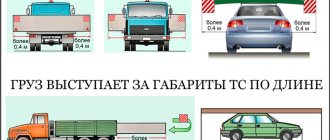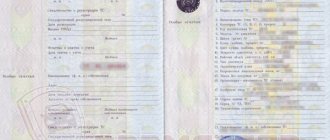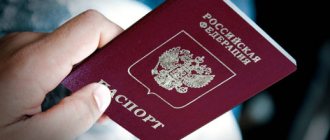What is it, what articles of the Civil Code of the Russian Federation is it regulated?
Reference. Ownership of a vehicle is a real right that gives its owner the opportunity to freely dispose of the vehicle, including transferring it to third parties under an agreement.
In the Russian Federation there are the following forms of ownership:
- state federal;
- state regional;
- public organizations;
- private.
Based on numerical characteristics, individual, public and group property is distinguished.
Legislative regulation of ownership of a vehicle and its transfer is based on Art. 218, 223, 224 and 235 of the Civil Code of the Russian Federation.
Owner and owner of transport - what is the difference?
The owner of the vehicle is the person whose data is reflected in the title. The owner is considered to be a person who legally controls the vehicle, for example, by power of attorney or by lease. It is the owner who is responsible for damage caused in the event of an accident.
At what age can you become the owner of a car? Can you have a minor child?
Civil legislation does not provide for age restrictions regarding vehicle owners.
In accordance with the administrative regulations “On the procedure for registering motor vehicles,” if a car is registered in the name of a person under the age of 14, a guardian or parent must act as an official representative. The interests of the child can be represented by another person who has confirmed his status in writing.
Persons over 14 years of age can apply for a vehicle themselves if they have written permission from their parents or guardians. It is important to remember that minors are prohibited from driving.
The owner of the vehicle as a special subject of administrative responsibility
OWNER (OWNER) OF THE VEHICLE AS A SPECIAL SUBJECT OF ADMINISTRATIVE RESPONSIBILITY
SPECIAL ORDER OF BRINGING TO ADMINISTRATIVE RESPONSIBILITY OF OWNERS OF VEHICLES
Summary. In the article the author considers the specifics of the legal status of the owner of the vehicle as a special subject of administrative responsibility.
Key words: administrative responsibility; owner; vehicle; subject of administrative responsibility; special technique means; presumption of innocence.
The increase in the number of traffic offenses, often leading to grave consequences, contributed to the development and implementation, taking into account positive foreign experience, of a system for automatic photo and video recording of administrative offenses in the field of traffic in the Russian Federation.
In this regard, it became necessary to introduce many amendments and additions to the current legislation regulating the grounds and procedure for bringing to administrative responsibility. In particular, the Code of Administrative Offenses of the Russian Federation (hereinafter referred to as the Code of Administrative Offenses of the Russian Federation) was supplemented by Federal Law of July 24, 2007 No. 210-FZ “On Amendments to the Code of the Russian Federation on Administrative Offenses” [1] with Article 2.6.1 , establishing the administrative responsibility of the owners (possessors) of vehicles [2].
Thus, modern domestic legislation on administrative offenses classifies the owners (possessors) of vehicles as special subjects of administrative liability. At the same time, in the scientific literature, special subjects of administrative responsibility are understood as persons who have specific characteristics that are directly indicated in the legal norm and the presence of which the legislator considers mandatory for a specific offense [3].
The Code of Administrative Offenses of the Russian Federation does not contain a definition of the concept of owner (owner) of vehicles. However, we can find it in Article 1 of the Federal Law of April 25, 2002 No. 40-FZ “On compulsory insurance of civil liability of vehicle owners,” according to which the owner of a vehicle is understood as the owner of the vehicle, as well as the person who owns a vehicle by virtue of the right of economic management or the right of operational management or by virtue of another legal basis [4].
Such other legal grounds may include the right to lease or an order from the relevant authority to transfer a vehicle to a specific person). At the same time, a person who drives a vehicle due to the performance of his official or labor duties, including on the basis of an employment or civil contract with the owner or other owner of the vehicle, will not be the owner of the vehicle.
Accordingly, the owner of the vehicle should be recognized as the person to whom the ownership of the corresponding vehicle is registered in accordance with the procedure established by law.
The specifics of the legal status of the owner (possessor) of a vehicle are manifested in the following.
First of all, it should be pointed out that in accordance with the current civil legislation, the owner (holder) of a vehicle can be either an individual or a legal entity. Consequently, the subject of liability for administrative offenses in the field of road traffic, committed with the use of vehicles recorded by special technical means operating automatically, can be not only an individual, but also a legal entity, to whom the ownership of the corresponding vehicle is registered. The Plenum of the Supreme Court of the Russian Federation also draws attention to this fact in its clarifications [5].
In addition, the Supreme Court of the Russian Federation indicated that legal entities not only act as subjects of traffic offenses under Chapter 12 of the Code of Administrative Offenses of the Russian Federation by virtue of Part 1 of Art. 2.6.1 of the Code of Administrative Offenses, but also on them in accordance with Art. 213 of the Civil Code of the Russian Federation, the responsibility lies with proving one’s innocence, like any other owner of a vehicle whose offense was recorded by special technical means operating automatically [6].
For example, ownership of vehicles can be registered in the name of the lessor company, which is the actual owner until the lessee pays the lease payments stipulated by the contract.
We believe that the allocation in Art. 2.6.1 of the Code of Administrative Offenses of the Russian Federation of the owner from among other owners of vehicles has important practical significance. So, in accordance with Part 3 of Art. 28.6 of the Code of Administrative Offenses of the Russian Federation, in the event of detection of administrative offenses in the field of road traffic, using special technical means operating in automatic mode with photo and video recording functions, a protocol on the administrative offense is not drawn up, and a decision on the case is made without the participation of the person against whom the case was initiated administrative offense, and is formalized in the manner provided for in Art. 29.10 Code of Administrative Offenses of the Russian Federation.
In such cases, copies of the resolution in the case of an administrative offense and materials obtained using automatic special technical means with photo and video recording functions are sent to the person against whom the case of an administrative offense was initiated by registered mail in the form of a copy resolution on paper or in the form of an electronic document signed with an enhanced qualified electronic signature of an authorized official, using the Unified Portal of State and Municipal Services, taking into account the Rules for the provision of postal services within three days from the date of issuance of the said resolution.
Thus, in these cases, the initial addressee of the relevant procedural documents (decrees and materials on the case) is always the owner of the vehicle. This is due, first of all, to the fact that in the vehicle registration database of the State Traffic Safety Inspectorate of the Ministry of Internal Affairs of Russia the owner of the vehicle is indicated.
In fact, the above rule means that a person who is the owner (possessor) of a vehicle can be brought to administrative liability without participating in the consideration of a case of an administrative offense. He has the opportunity to prove his innocence only within the framework of the procedure for appealing the relevant decision after receiving it in the manner prescribed by law.
In this regard, we note the position of the Constitutional Court of the Russian Federation, which indicated that provided for by the legislator in Art. 2.6.1 of the Code of Administrative Offenses of the Russian Federation, a mechanism that makes it possible to bring not only individuals but also legal entities to administrative responsibility for administrative offenses in the field of road traffic, is primarily aimed at preventing the commission of offenses that are associated with an increased threat to the life, health and property of road users movement, and therefore is aimed at ensuring the protection of constitutionally significant values proclaimed in Part 3 of Article 55 of the Constitution of the Russian Federation [7].
Another circumstance that emphasizes the specificity of the legal status of the owner (possessor) of a vehicle as a subject of administrative liability is that its appearance is determined solely by the method of identifying and recording the relevant act, which is given the significance of a sign of an administrative offense. We are talking about technical means operating in automatic mode, which are divided into two groups:
a) special technical means that have the functions of photography, filming, video recording,
b) means of photography, filming, and video recording.
The use of similar technical means operating in a different mode presupposes the mandatory subsequent stopping of vehicles and the registration of case materials on administrative offenses against their drivers who are direct violators of the Traffic Rules, in the general manner provided for by the Code of Administrative Offenses of the Russian Federation.
An analysis of the materials of judicial practice allows us to conclude that failure to comply with the above procedure for bringing to administrative responsibility in this case indicates a significant violation of the procedural requirements provided for by the Code of Administrative Offenses of the Russian Federation and regulating the procedure for bringing a person to administrative responsibility, and is the basis for the cancellation of the official’s decision[8].
The specificity of the legal status of the owner (owner) of a vehicle as a subject of administrative liability is also emphasized by the provision contained in Part 2 of Art. 2.6.1 of the Code of Administrative Offenses of the Russian Federation, according to which the owner (owner) of a vehicle is exempt from administrative liability if, during the consideration of a complaint against a decision in a case of an administrative offense made in accordance with Part 3 of Art. 28.6 of the Code of Administrative Offenses of the Russian Federation, the data contained in it will be confirmed that at the time the administrative offense was recorded, the vehicle was in the possession or use of another person, or at that moment had left its possession as a result of illegal actions of other persons [9, P. 33] .
Summarizing the above, it should be concluded that today, improving the legal status of the owner (possessor) of a vehicle as a special subject of administrative responsibility for traffic offenses recorded through automatic special technical means with photo and video recording functions is extremely relevant and a complex task that requires an immediate solution in order to ensure the protection of the rights and legally protected interests of traffic participants.
Literature
1. On amendments to the Code of the Russian Federation on Administrative Offenses: federal. Law of July 24, 2007 No. 210-FZ (as amended on December 31, 2014) // Collection of legislation of the Russian Federation. – 2007. – No. 31 (part 1). – St. 4007.
2. Code of the Russian Federation on Administrative Offenses: federal. Law of December 30, 2001 No. 195-FZ (as amended on November 27, 2017) // Collection of legislation of the Russian Federation. – 2002. – No. 1 (part 1). – St. 1.
3. Code of the Russian Federation on Administrative Offences. Chapters 1 - 10. Article-by-article scientific and practical commentary / under the general. ed. B.V. Rossinsky. – M.: Library of the “Rossiyskaya Gazeta”, 2014. – Issue. VII – VIII // SPS “Consultant Plus”
4. On compulsory civil liability insurance of vehicle owners: federal. Law of April 25, 2002 No. 40-FZ (as amended on May 1, 2019) // Collection of legislation of the Russian Federation. – 2002. – No. 18. – Art. 1720.
5. On some issues that arise for courts when applying the Special Part of the Code of the Russian Federation on Administrative Offences: Resolution of the Plenum of the Supreme Court of the Russian Federation dated October 24, 2006 No. 18 (as amended on June 25, 2019) // Bulletin of the Supreme Court of the Russian Federation. – 2006. – No. 12.
6. Review of legislation and judicial practice of the Supreme Court of the Russian Federation for the first quarter of 2010 (approved by the Resolution of the Presidium of the Supreme Court of the Russian Federation dated June 16, 2010) (as amended on December 8, 2010) // SPS “Consultant Plus”
7. On the refusal to accept for consideration the complaint of the limited liability company “Commercial Bank “Transportny” for violation of constitutional rights and freedoms by part 1 of article 2.6.1 and part 2 of article 12.9 of the Code of the Russian Federation on Administrative Offenses: ruling of the Constitutional Court of the Russian Federation dated 17.07. 2012 No. 1286-O // SPS “Consultant Plus”
8. Judicial practice in administrative cases. Bulletin of judicial practice of the Moscow Regional Court for the first quarter of 2015 (approved by the Presidium of the Moscow Regional Court on June 17, 2015) // ATP “Consultant Plus”
9. Yakimov A.Yu. Owners (owners) of vehicles participating in road traffic as special subjects of legal liability / A.Yu. Yakimov // Administrative law and process. – 2021. – No. 11. – P. 32 – 36.
When this moment of transition occurs, what does it mean?
Transfer of ownership of a vehicle is the transfer of rights and obligations associated with the vehicle to another person. According to Art. 223 of the Civil Code of the Russian Federation, this right begins from the moment when the property passes into the ownership of another person, unless otherwise provided by law or agreement. As stated in Part 2 of Art. 218 of the Civil Code of the Russian Federation, the basis for the transfer of ownership of a thing is a purchase and sale agreement.
What confirms the occurrence of this moment?
Important! The main title document for a car is the vehicle passport (PTS). If the car is new, you can get it from the manufacturer, supplier or customs authorities.
To confirm the transfer of rights to a used car, a notarized sales contract is drawn up, and the title is provided by the seller.
In addition, the owner must have a compulsory motor liability insurance policy and a vehicle registration certificate in case of a traffic police inspection.
The car's license plates are entered into the database indicating the owner. Only after completing the registration procedure can you become a full owner.
In what cases should recognition be sought?
Recognition of ownership of a car is carried out by court order in the following cases:
- legacy transport section;
- loss of title documentation;
- division of property during divorce.
In addition, this procedure often accompanies transactions:
- purchase and sale;
- donations;
- exchange.
The need for it arises in the absence of important parts of the legal process.
A claim for recognition of property rights will be accepted only if the need to resolve the issue with the participation of judicial authorities becomes obvious.
How to transfer a car to a new owner?
The procedure is carried out at MREO and consists of several stages:
- Collection of documents specified in clause 15 of Order No. 605 of the Ministry of Internal Affairs of Russia.
- Visit to the registration office of the traffic police with a package of papers and an application for registration.
- Passing a vehicle inspection.
- Payment of state duty.
- Receiving new documents.
Reference! According to the regulations of the Ministry of Internal Affairs, which came into force in 2013, in order to re-register a car to another owner, it is not necessary to deregister the vehicle.
Lost PTS? How to restore if lost and how much it costs: instructions
PTS is a document that can be compared to an ordinary person's identity card. Many people often confuse the concepts and do not fully understand which body issues it. Some people do not understand whether it is allowed to make a copy of it, in contrast to a technical passport (STS), when it is necessary to present it to a police officer.
Pts - what is it?
A vehicle passport is an official document that confirms a person’s ownership of the vehicle. Based on the title, any legal transactions with the car are carried out, be it sale, transfer of driving rights, donation, etc. The PTS is the main document that allows you to manage the vehicle and perform legal transactions with its participation. It displays important data regarding the vehicle, including:
- Mark;
- Model;
- Type;
- Power;
- Year of manufacture;
- VIN number;
- Body code;
- Power unit volume;
- Information about the owner.
PTS is a document evidencing ownership of a car.
For vehicles on credit, a mark indicating the encumbrance of property rights is placed in the PTS. Losing a document promises big troubles and problems for the owner.
Specifics of the recovery procedure
During the production of a new PTS, the owner of the car is presented with a duplicate certificate, which will have similar legal force. It is issued after submitting the established list of documents within 7 working days. In exceptional cases, for the purpose of additional verification of information on the history of the vehicle, this period may be extended to 30 days by traffic police officers.
Registration of a PTS is carried out by personally contacting the state inspectorate with presentation of the car
Registration of a PTS is carried out by personally contacting the state inspectorate with presentation of the car
Restoration of the technical equipment passport is carried out at the place of registration of the vehicle. The initiator of the process is the owner of the vehicle by submitting an application. Its form can be found online, on an information board, or in person from a traffic police officer.
You will definitely need to write an explanatory note detailing the circumstances under which the document was lost.
Registration of a duplicate is carried out with the obligatory presentation of the car for which a new title is required. This is necessary to verify information regarding installed units, numbers and other data by the expert service. After inspection, a note is made in the application regarding the possibility of providing PTS.
Preparation of documents
The law clearly defines the minimum package of papers that will be required when producing a lost vehicle passport. The car owner will need to present:
- A general passport of the Russian Federation, or another document with a photo identifying the person who applied;
- Temporary registration paper (in the absence of permanent registration);
- Certificate of registration of the STS vehicle in the original (technical passport) or its duplicate;
- A certificate confirming the existence of ownership of the vehicle, whether it is a power of attorney, a deed of gift or a purchase and sale agreement;
- Receipt of payment of the duty in favor of the state;
- A completed application on a special form;
- OSAGO policy.
What is STS of a car, why is it needed and what is the difference between PTS and STS
When registering a new PTS, you must prepare a minimum package of documents
A compulsory motor vehicle liability insurance policy is not a mandatory document when registering or restoring a vehicle title. It is recommended to have it with you. According to the traffic rules, you are not allowed to drive onto public roads without compulsory motor liability insurance.
Ordering a PTS without the participation of the owner
Sometimes the car owner is physically unable to be present during the re-issuance of a vehicle passport. For example, during a long business trip, selling a car by proxy, or donating it to a person permanently residing in another region. Therefore, you will need to pre-issue a special document. We are talking about a general power of attorney
, which must contain information about granting a specific person the full right to conduct any legal operations on the vehicle. It is completed within an hour by any notary.
Restoration cost
We will provide information regarding the upcoming costs of restoring the vehicle title (according to clause 36, clause 1, article 333.33 of the Tax Code of the Russian Federation). They consist of payments:
- State duty - 800 rubles;
- Re-registration of documents – 1200 rubles;
- Services for replacing a car certificate – 500 rubles.
When applying through the public services service, a 30% discount is provided. You can see the payments clearly in the table.
Legal powers and responsibilities
According to legislative act No. 283-FZ dated 08/03/2018 (as amended on 07/30/2019), the owner of the vehicle has the right to:
- Carrying out state registration of a car. In this case, the choice of the traffic police department for entering data into the database can be made regardless of the applicant’s place of registration.
- Preservation of the number assigned to the vehicle, as well as its transfer upon sale or donation. The new owner can accept the car with the existing number or replace it.
- Obtaining registration marks that correspond to the state standard on the basis of clause 5. No. 256-FZ of July 30, 2019.
Along with rights come obligations:
- Within 10 days from the date of receipt of a vehicle that was not previously registered, you must go through the registration procedure. The same period is given for filing an application for a change of owner and making appropriate changes to the registration data.
- Independently visit the organization that produces registration plates to obtain them.
- Contact the registration department to perform other actions provided for in Art. 10 No. 283-FZ, for example, to restore a lost or deteriorated vehicle title.
- If necessary, provide the registration department with a vehicle for inspection.
- Pay transport tax on time.
Civil liability of the vehicle owner, also in case of an accident
The owner of a car who causes harm to others bears civil liability for this.
Damage must be compensated without fail, except for the following cases:
- the impact of a natural disaster or other force beyond control;
- damage caused by an unknown person;
- the cause of the damage was the malicious intent of the victim.
According to Art. 1079 of the Civil Code of the Russian Federation, a car is a source of increased danger, therefore the owner of the vehicle must compensate for the damage, even if it is proven that he was not involved in this situation.
For example, if a driver, in order to avoid hitting a pedestrian, is involved in an accident in which passengers are injured, he must first pay compensation to the victims and only then try to press charges against the pedestrian.
According to the Civil Code of the Russian Federation, mandatory compensation is subject to:
- moral injury;
- damage caused to property;
- harm to health.
Important. As stated in Art. 1083 of the Civil Code of the Russian Federation, if the victim committed negligence, due to which the harm caused to him increased, the amount of compensation payment will be reduced. In addition, the justice authorities must take into account the financial situation of the perpetrator.
What powers can be transferred to a third party by power of attorney?
The owner of the vehicle can transfer the following rights to the vehicle to third parties:
- order of the vehicle;
- passing a technical inspection;
- receiving a vehicle from the impound lot;
- registration of an insurance policy;
- registration of vehicles with the traffic police;
- obtaining a duplicate license plate number.
If third parties plan to complete a purchase and sale transaction, appear in court or travel abroad, the power of attorney should be certified by a notary. In other cases, it is enough to present a handwritten form of the document.
The right to drive a car in accordance with clause 2.1.1 of the Traffic Regulations is transferred without drawing up a power of attorney. Upon request, the driver will be required to present a package of documents for the vehicle and valid insurance.
Cost of owning a vehicle
When purchasing a car, many people do not think about the costs of its operation. The total amount depends on the make, model of the vehicle and region, and is calculated based on the following indicators:
- Loss of value after 3 years of use.
- Interest if the car was borrowed.
- Taxes and fees, including those necessary for registering a vehicle with the traffic police.
- Fuel.
- Insurance.
- Technical inspections.
- Other expenses: car wash, tire replacement.
Why is verification needed?
Checking a car to obtain information about the owner is necessary in the following situations:
- Car damage. If you were cut off on the road or violated traffic rules, which led to damage to the car, then you need to find the culprit to compensate for material damage. Contacting the traffic police does not always solve this problem, so it is worth considering options for searching for the violator yourself.
- The driver fled the scene of the accident. Police officers are searching for the offender, studying witness statements and footage from video recorders. But the search for the culprit of the accident may drag on indefinitely, and the car needs to be restored as quickly as possible. In this case, you can identify the car by number and find out who its owner is in order to demand compensation.
- Buying a used car. To avoid buying a car from scammers who resell someone else's property using fake documents, it is recommended to make a request to the database. This will ensure that the seller is the owner and has the right to sell the vehicle.
- Wrong parking. If a motorist parks in the yard of your house in such a way that there is little free space for pedestrians, then you can find the owner and tell your complaints.
You can record a violation and transfer the recording to the police, but the likelihood that the motorist will be found and punished is extremely low. Therefore, it is worth doing your own search.
Restrictions
In some cases, the owner's rights to a vehicle may be limited. There are several types of encumbrances:
- Pledge. Used to ensure the borrower fulfills loan obligations. A citizen has the right to drive a vehicle, but transferring property to third parties is prohibited. After final settlement with the creditor, the owner can use the car again. If the money is not paid, the car is repossessed to pay off the debt.
- Arrest. Used to force the debtor to repay finances taken from the bank. In addition, this measure may be necessary to preserve the value of the property. The vehicle is withdrawn until the relationship between the lender and the borrower is resolved. An arrest can be made by the police, a court, or an organization executing a court order.
- Search. An encumbrance is imposed if the vehicle is included in the database of objects wanted by law enforcement agencies. In this case, it will not be possible to cross the border with it. Any interested person can find out that a car is wanted, so an attempt to sell such a car will most likely end up in a police station.
Important! Care should be taken to remove encumbrances before concluding a purchase and sale transaction. Otherwise, the vehicle will not be re-registered to the new owner.
Joint and several liability in case of an accident of the owner and driver
Joint and several liability of the owner and driver is quite rare. It can arise if the damage from an accident exceeds the maximum payments of the insurance company. And the driver does not have property from which full payments can be made to the injured party.
The injured party has the right to choose when making claims for damages. Claims can be made against one or several persons. Judicial practice in this matter is quite extensive and when making a decision, the judge takes into account many nuances of what happened.
Grounds for termination
According to Art. 235 of the Civil Code of the Russian Federation, ownership rights are terminated in the following cases:
- upon alienation of the vehicle to third parties;
- in case of voluntary renunciation of property rights;
- when the car is destroyed;
- upon confiscation.
The basis for alienation is a contract of sale or donation. The obligations of the owner of the car cease only when the rights to it are transferred to another person.
This means that if there was an encumbrance on the scrapped vehicle, compensation will still have to be paid.
Civil Code
Buying a car is an operation that allows you to obtain certain civil rights. Namely, the right of ownership of property. In our case - on a vehicle.
Ownership of a car arises from the moment it is transferred to the buyer. This is exactly what the Civil Code of the Russian Federation says. This statement can be found in Article 223, paragraph 1.
However, there is one caveat here - “unless otherwise provided by law or applicable agreement.” This means there are exceptions.
Problems and difficult questions
- What are the features of the transfer of ownership from an individual to a legal entity? The previous owner of the vehicle can give the buyer who purchases the car for the purpose of subsequent sale the authority to terminate the registration of the vehicle with the traffic police. These powers are specified in the agreement or power of attorney.
- If a duplicate car is discovered, what should the owner of the original do? Most often, drivers find out about the existence of a double car when they start receiving fines.
In this case, you should write a statement to the traffic police, mentioning your non-involvement. It will be necessary to prove that the car was in a different place at the time of the offense. Comparing the original vehicle with CCTV footage can also help. In difficult situations, you will have to order an examination. - Who bears the tax burden when selling a vehicle? The owner whose details are indicated in the PTS.
- Will the new owner have problems registering a vehicle that was confiscated before purchase? Traffic police officers can track the entire history of the car. If there is no prohibition on registration, there are no grounds for refusal to the new owner. In any case, it is recommended to ensure that there are no encumbrances before purchasing.
- How to find information about the owner of the vehicle? Knowing the license plate number of the car, you can contact the traffic police and get an extract from the database about this vehicle. But you can count on providing such information only in the following cases:
- The vehicle is blocking the exit from the parking lot;
the driver of the car, as well as the person wishing to obtain information about him, was involved in an accident.
- How to change owner details? You must submit an application through State Services or during a personal visit to the traffic police department. After this, you need to drive your car to the State Traffic Inspectorate. You must take with you a printed application form, a receipt confirming payment of the state fee, and original documents. Once the review is completed, changes will be made to the papers.
In addition, on the official website of the traffic police you can check the vehicle by VIN code. There is no specific information about the owner in such an extract, but you can find out his status - an individual or legal entity.
Ownership of a vehicle is regulated by law, so law enforcement agencies can easily determine who should control and be responsible for the vehicle. Having understood this issue, the buyer can be confident in the purity of the transaction and the legality of his actions.
Find out the owner of the car by VIN number
There are no official ways to find out the owner of a car online by the car’s VIN code. This service is not available on government portals for the same reasons as searching for the owner of a car by state number.
You can check the owner of a car by VIN code using one of the unofficial resources. There are several sites on the Internet that provide such services for free or for money. However, just like by license plate number, checking the owner of a car by VIN using unofficial sources does not guarantee that you will receive up-to-date and reliable information, or that you will receive it at all.
On government websites you have the opportunity to check the number of car owners by VIN. This service is provided, for example, by the official website of the traffic police.
To use an online car check by VIN code, on the main page of the State Traffic Inspectorate website, select “Services” and go to the “Car Check” subsection.
Enter your vehicle's VIN and click on "request verification".
After entering the code from the picture, you will see a window with basic information about the car, and below - the history of all its owners with vehicle registration periods:
When checking the number of vehicle registrations, personal information of owners still remains closed to public viewing.
Reasons for car ownership
Does ownership of a car arise if the purchase is not paid for? Usually not. As a rule, the bulk of agreements provide for the transfer of vehicles to new owners after full repayment of the debt. But there are exceptions. Especially if the need to pay in full for the purchase is not specified in the current agreement.
Ownership of a car arises in the following cases:
- inheriting a car;
- making an exchange;
- purchase;
- winning vehicle;
- receiving a car from the state as support (an extremely rare option).
In any case, from the moment of signing a particular agreement, a person is considered to be the owner of the car. And as soon as he registers the car with the traffic police, he will have the right to drive the car without fear and legally.
Registration
Enough has already been said about car ownership. Now it’s worth considering the procedure for registering a vehicle with the traffic police. You must contact the authority at the place of registration of the new owner of the property.
To register your car, you must bring with you:
- receipt with paid duty;
- contract of sale;
- identification;
- previous car registration certificate.
Based on these documents, the person will be re-registered with the traffic police. The main thing is to write an application for registration of the car with new data. There is nothing complicated about this.
Registration deadlines
How quickly will a citizen have to register a car with the traffic police in his name? In Russia there are certain time restrictions regarding this issue.
Once ownership of a vehicle has arisen, it must be registered within 10 days. That is, a person can drive a car for 10 days using old documents, subject to a purchase and sale agreement. After this, you will either have to register the car with the traffic police, or the right to drive the car will be lost. It will be restored after registration with the relevant authority.
How long will it take for a citizen to reissue documents? This usually takes several days. But in practice, most often it is enough to spend about 1 day to go through the full re-registration procedure and receive the relevant documents. Every year this operation is simplified more and more.
Contract instructions
When does ownership of a car arise? Much depends on the specific agreement signed between the buyer and seller. Ideally, ownership of a vehicle begins from the moment the car is handed over to the new potential owner for permanent use.
But, as we have already found out, there are exceptions. For example, if the purchase and sale agreement states that the citizen will be considered the owner after full payment for the purchase. In this case, you will first have to pay off the debt, and then consider yourself a full owner.











